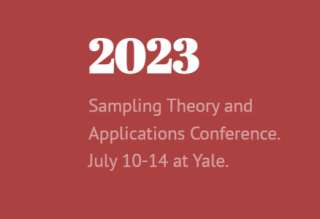SPS Feed
Top Reasons to Join SPS Today!
1. IEEE Signal Processing Magazine
2. Signal Processing Digital Library*
3. Inside Signal Processing Newsletter
4. SPS Resource Center
5. Career advancement & recognition
6. Discounts on conferences and publications
7. Professional networking
8. Communities for students, young professionals, and women
9. Volunteer opportunities
10. Coming soon! PDH/CEU credits
Click here to learn more.
The Latest News, Articles, and Events in Signal Processing
It is our great pleasure to introduce the first part of this special issue to you! The IEEE Signal Processing Society (SPS) has completed 75 years of remarkable service to the signal processing community. When the Society was founded in 1948, we couldn’t imagine, for instance, how wireless networks of smartphones would be able to connect us easily at all times, or that an image processing algorithm would be able to detect cancer in a few seconds.
Signal processing (SP) is a “hidden” technology that has transformed the digital world and changed our lives in so many ways. The field of digital SP (DSP) took off in the mid-1960s, aided by the integrated circuit and increasing availability of digital computers. Since then, the field of DSP has grown tremendously and fueled groundbreaking advances in technology across a wide range of fields with profound impact on society.
When I began writing this 75th anniversary article celebrating women in signal processing (SP), I reread the 1998 editorial titled “Fifty Years of Signal Processing: 1948–1998” [1] . At that time, IEEE had more than 300,000 members in 150 nations, the world’s largest professional technical Society. Within the IEEE umbrella, there were 37 IEEE Societies and technical groups, and the IEEE Signal Processing Society (SPS) was the oldest among its many Societies.
Throughout the IEEE Signal Processing Society’s (SPS’s) history, conferences have functioned as a main way to connect within the Society, bringing together the signal processing research community to discuss and debate, establish research collaborations, and have a good time.
A coarse-to-fine SR CNN (CFSRCNN) consisting of a stack of feature extraction blocks (FEBs), an enhancement block (EB), a construction block (CB) and, a feature refinement block (FRB) is proposed to learn a robust SR model.
Members
Note: View the full downloadable list of the past TCI members (right-click, Save As, to save file).
Use the scroll bars on the right or bottom of the list below, to view more.
Date: 10-14 July 2023
Location: New Haven, CT, USA

Location: Instituto de Telecomunicações, Instituto Superior Técnico, University of Lisbon, Portugal
Date: 20 September 2023
Time: 11:00 AM ET (New York Time)
Speaker(s): Dr. Xudong Zhang, Dr. Fangzhou Wang, Dr. Hongbin Li
Date: 13 February 2023
Time: 2:30 PM ET (New York Time)
Full webinar details
Date: 18 April 2023
Time: 3:00 PM CET (Local time)
Presenter(s): Dr. Matthews Jacob
Date: 14 September 2023
Time: 7:30 AM ET (New York Time)
Speaker(s): Dr. Cheng Lu, Dr. Ya-Feng Liu, Dr. Jing Zhou

The Signal Processing, Learning, and Computing (SPLC) Group at the Baltic Institute of Advanced Technology (BPTI) seeks a postdoctoral researcher in theoretical and applied signal processing.
The successful candidate will develop new computational methods for airborne object recognition in radar signals.
One year ago, I was writing the IEEE Signal Processing Magazine 2022 May editorial when the Russian army brutally attacked Ukraine. One year after, war is always present… I can’t understand how a single man and his entourage can unleash such a killing spree and be responsible for so many deaths, especially innocent victims like children.
Pages
SPS Social Media
- IEEE SPS Facebook Page https://www.facebook.com/ieeeSPS
- IEEE SPS X Page https://x.com/IEEEsps
- IEEE SPS Instagram Page https://www.instagram.com/ieeesps/?hl=en
- IEEE SPS LinkedIn Page https://www.linkedin.com/company/ieeesps/
- IEEE SPS YouTube Channel https://www.youtube.com/ieeeSPS




















